Pernille Ripp's Blog, page 53
July 5, 2016
Some Favorite Book Club Books for Middle School
Every March, my students hold their book clubs. It is something we work toward all year and by spring they are mostly all excited to do them. As I have tweaked the process, one of the biggest changes I made was to step away from only a few selected books for them to read and instead open it up to as many books as possibly. With the help of the great selection of cheap books at Books4schools.com our book club set selection is now over 50 different titles and I am always looking to expand. We no longer have a theme to the books, besides whether or not they are a great book, and students seem to always be able to find several books that they would like to dig into. Because I teach kids from very varied backgrounds, some are ready for more mature books than others. If a group collectively chooses a more mature book such as Speak or The Absolutely True Diary of a Part-Time Indian then I make sure their parents are alright with it. Because of this I always encourage educators to read the books they have students choose from to make sure they are actually meaningful books and also a great experience for the intended age group.
So here are some of my students’ favorite book club books in 7th grade.
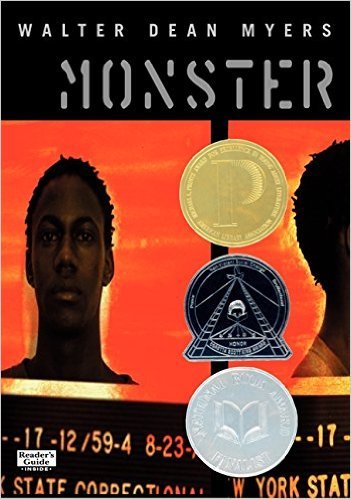
From Amazon:
Fade In: Interior: Early Morning In Cell Block D, Manhattan Detention Center.
Steve (Voice-Over)
Sometimes I feel like I have walked into the middle of a movie. Maybe I can make my own movie. The film will be the story of my life. No, not my life, but of this experience. I’ll call it what the lady prosecutor called me … Monster.
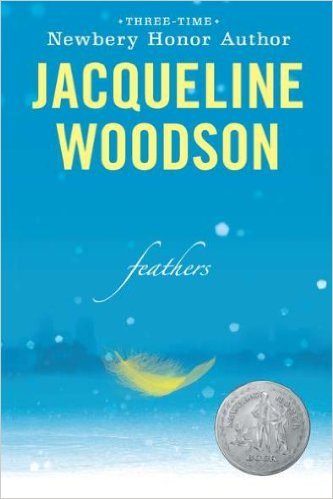
Feathers by Jacqueline Woodson
From Amazon:
“Hope is the thing with feathers” starts the poem Frannie is reading in school. Frannie hasn’t thought much about hope. There are so many other things to think about. Each day, her friend Samantha seems a bit more “holy.” There is a new boy in class everyone is calling the Jesus Boy. And although the new boy looks like a white kid, he says he’s not white. Who is he?
During a winter full of surprises, good and bad, Frannie starts seeing a lot of things in a new light—her brother Sean’s deafness, her mother’s fear, the class bully’s anger, her best friend’s faith and her own desire for “the thing with feathers.”
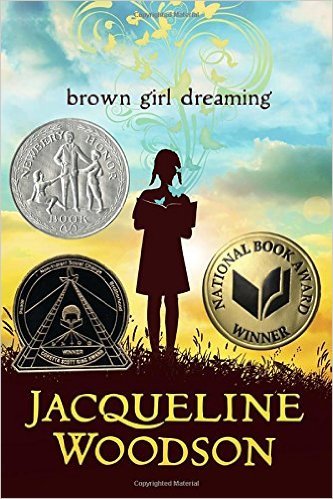
Brown Girl Dreaming by Jacqueline Woodson
From Amazon:
Raised in South Carolina and New York, Woodson always felt halfway home in each place. In vivid poems, she shares what it was like to grow up as an African American in the 1960s and 1970s, living with the remnants of Jim Crow and her growing awareness of the Civil Rights movement. Touching and powerful, each poem is both accessible and emotionally charged, each line a glimpse into a child’s soul as she searches for her place in the world. Woodson’s eloquent poetry also reflects the joy of finding her voice through writing stories, despite the fact that she struggled with reading as a child. Her love of stories inspired her and stayed with her, creating the first sparks of the gifted writer she was to become.
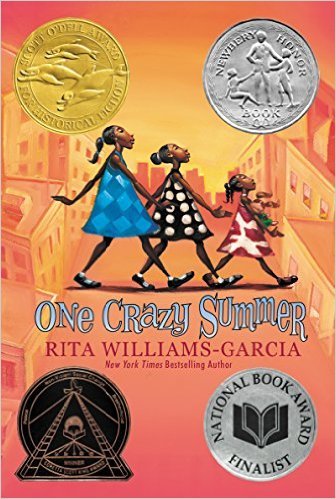
One Crazy Summer by Rita Williams-Garcia
From Amazon:
Eleven-year-old Delphine is like a mother to her two younger sisters, Vonetta and Fern. She’s had to be, ever since their mother, Cecile, left them seven years ago for a radical new life in California. When they arrive from Brooklyn to spend the summer with her, Cecile is nothing like they imagined. While the girls hope to go to Disneyland and meet Tinker Bell, their mother sends them to a day camp run by the Black Panthers. Unexpectedly, Delphine, Vonetta, and Fern learn much about their family, their country, and themselves during one truly crazy summer.

Orbiting Jupiter by Gary D. Schmidt
From Amazon:
The two-time Newbery Honor winner Gary D. Schmidt delivers the shattering story of Joseph, a father at thirteen, who has never seen his daughter, Jupiter. After spending time in a juvenile facility, he’s placed with a foster family on a farm in rural Maine. Here Joseph, damaged and withdrawn, meets twelve-year-old Jack, who narrates the account of the troubled, passionate teen who wants to find his baby at any cost. In this riveting novel, two boys discover the true meaning of family and the sacrifices it requires.
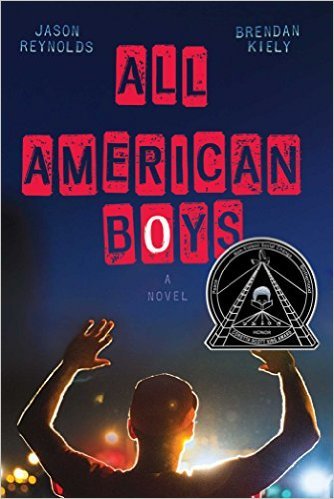
All American Boys by Brendan Kiely and Jason Reynolds
From Amazon:
A bag of chips. That’s all sixteen-year-old Rashad is looking for at the corner bodega. What he finds instead is a fist-happy cop, Paul Galluzzo, who mistakes Rashad for a shoplifter, mistakes Rashad’s pleadings that he’s stolen nothing for belligerence, mistakes Rashad’s resistance to leave the bodega as resisting arrest, mistakes Rashad’s every flinch at every punch the cop throws as further resistance and refusal to STAY STILL as ordered. But how can you stay still when someone is pounding your face into the concrete pavement?
There were witnesses: Quinn Collins—a varsity basketball player and Rashad’s classmate who has been raised by Paul since his own father died in Afghanistan—and a video camera. Soon the beating is all over the news and Paul is getting threatened with accusations of prejudice and racial brutality. Quinn refuses to believe that the man who has basically been his savior could possibly be guilty. But then Rashad is absent. And absent again. And again. And the basketball team—half of whom are Rashad’s best friends—start to take sides. As does the school. And the town. Simmering tensions threaten to explode as Rashad and Quinn are forced to face decisions and consequences they had never considered before.
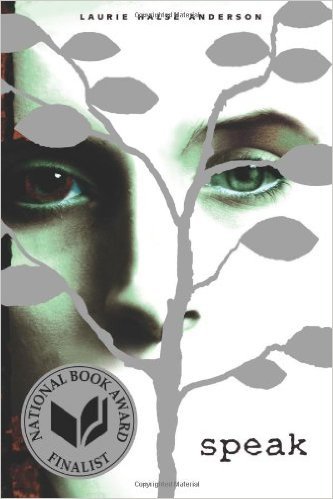
Speak by Laurie Halse Anderson
From Amazon:
“Speak up for yourself–we want to know what you have to say.” From the first moment of her freshman year at Merryweather High, Melinda knows this is a big fat lie, part of the nonsense of high school. She is friendless, outcast, because she busted an end-of-summer party by calling the cops, so now nobody will talk to her, let alone listen to her. As time passes, she becomes increasingly isolated and practically stops talking altogether. Only her art class offers any solace, and it is through her work on an art project that she is finally able to face what really happened at that terrible party: she was raped by an upperclassman, a guy who still attends Merryweather and is still a threat to her. Her healing process has just begun when she has another violent encounter with him. But this time Melinda fights back, refuses to be silent, and thereby achieves a measure of vindication.
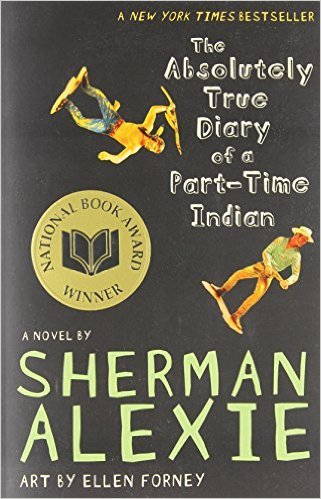
The Absolutely True Diary of a Part-Time Indian by Sherman Alexie
From Amazon:
Bestselling author Sherman Alexie tells the story of Junior, a budding cartoonist growing up on the Spokane Indian Reservation. Determined to take his future into his own hands, Junior leaves his troubled school on the rez to attend an all-white farm town high school where the only other Indian is the school mascot.
Heartbreaking, funny, and beautifully written, The Absolutely True Diary of a Part-Time Indian, which is based on the author’s own experiences, coupled with poignant drawings by Ellen Forney that reflect the character’s art, chronicles the contemporary adolescence of one Native American boy as he attempts to break away from the life he was destined to live.
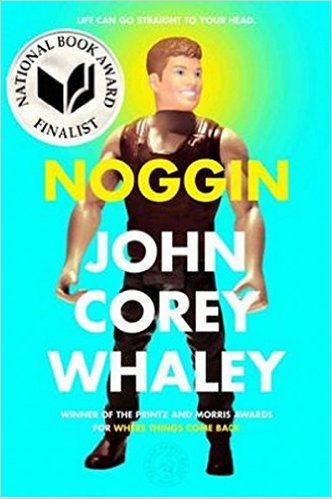
From Amazon:
Listen—Travis Coates was alive once and then he wasn’t.
Now he’s alive again.
Simple as that.
The in between part is still a little fuzzy, but Travis can tell you that, at some point or another, his head got chopped off and shoved into a freezer in Denver, Colorado. Five years later, it was reattached to some other guy’s body, and well, here he is. Despite all logic, he’s still sixteen, but everything and everyone around him has changed. That includes his bedroom, his parents, his best friend, and his girlfriend. Or maybe she’s not his girlfriend anymore? That’s a bit fuzzy too.
Looks like if the new Travis and the old Travis are ever going to find a way to exist together, there are going to be a few more scars.
Oh well, you only live twice.

From Amazon:
Alex Douglas always wanted to be a hero. But nothing heroic ever happened to Alex. Nothing, that is, until his eleventh birthday. When Alex rescues a stray dog as a birthday gift to himself, he doesn’t think his life can get much better. Radar, his new dog, pretty much feels the same way. But this day has bigger things in store for both of them.
This is a story about bullies and heroes. About tragedy and hope. About enemies with two legs and friends with four, and pesky little sisters and cranky old men, and an unexpected lesson in kindness delivered with a slice of pizza. This is Eleven: the journey of a boy turning eleven on 9/11.
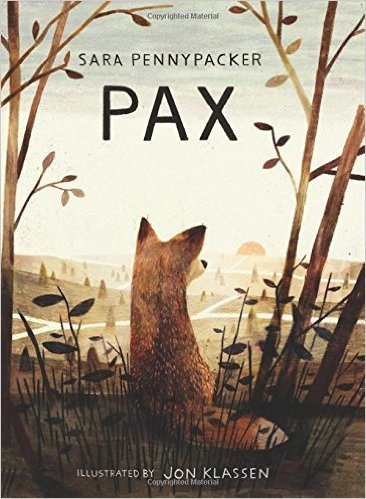
From Amazon:
Pax and Peter have been inseparable ever since Peter rescued him as a kit. But one day, the unimaginable happens: Peter’s dad enlists in the military and makes him return the fox to the wild.
At his grandfather’s house, three hundred miles away from home, Peter knows he isn’t where he should be—with Pax. He strikes out on his own despite the encroaching war, spurred by love, loyalty, and grief, to be reunited with his fox.
Meanwhile Pax, steadfastly waiting for his boy, embarks on adventures and discoveries of his own. . . .
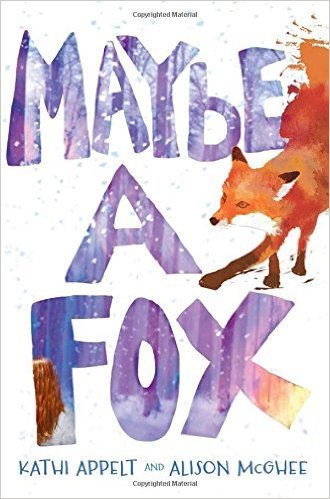
Maybe a Fox by Kathi Appelt and Alison McGhee
From Amazon:
Sylvie and Jules, Jules and Sylvie. Better than just sisters, better than best friends, they’d be identical twins if only they’d been born in the same year. And if only Sylvie wasn’t such a fast—faster than fast—runner. But Sylvie is too fast, and when she runs to the river they’re not supposed to go anywhere near to throw a wish rock just before the school bus comes on a snowy morning, she runs so fast that no one sees what happens…and no one ever sees her again. Jules is devastated, but she refuses to believe what all the others believe, that—like their mother—her sister is gone forever.
At the very same time, in the shadow world, a shadow fox is born—half of the spirit world, half of the animal world. She too is fast—faster than fast—and she senses danger. She’s too young to know exactly what she senses, but she knows something is very wrong. And when Jules believes one last wish rock for Sylvie needs to be thrown into the river, the human and shadow worlds collide.
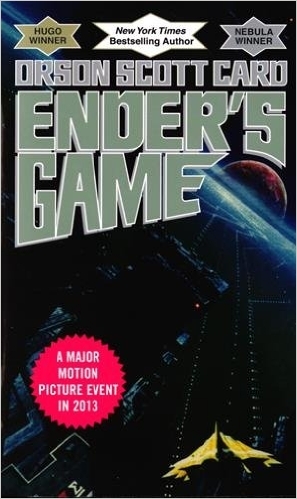
Ender’s Game by Orson Scott Card
From Amazon:
In order to develop a secure defense against a hostile alien race’s next attack, government agencies breed child geniuses and train them as soldiers. A brilliant young boy, Andrew “Ender” Wiggin lives with his kind but distant parents, his sadistic brother Peter, and the person he loves more than anyone else, his sister Valentine. Peter and Valentine were candidates for the soldier-training program but didn’t make the cut–young Ender is the Wiggin drafted to the orbiting Battle School for rigorous military training.
Ender’s skills make him a leader in school and respected in the Battle Room, where children play at mock battles in zero gravity. Yet growing up in an artificial community of young soldiers, Ender suffers greatly from isolation, rivalry from his peers, pressure from the adult teachers, and an unsettling fear of the alien invaders. His psychological battles include loneliness, fear that he is becoming like the cruel brother he remembers, and fanning the flames of devotion to his beloved sister.
Is Ender the general Earth needs? But Ender is not the only result of the genetic experiments. The war with the Buggers has been raging for a hundred years, and the quest for the perfect general has been underway for almost as long. Ender’s two older siblings are every bit as unusual as he is, but in very different ways. Between the three of them lie the abilities to remake a world. If the world survives, that is.

From Amazon:
Deenie’s mother wants her to be a model, with her face on magazine covers—maybe even in the movies—but Deenie wants to spend Saturdays with her friends Janet and Midge, tracking Harvey Grabowsky, the captain of the football team, around Woolworth’s. She wants to be a cheerleader, too, and go to the seventh-grade mixer to hear Buddy Brader play his drums.
Instead, Deenie is diagnosed with scoliosis. And that means body stockings to squeeze into, a roomful of strangers to face, and a terrifying brace that she’ll need to wear for years that goes from her neck to her hips. Suddenly Deenie has to cope with a kind of specialness that’s frightening—and might be hers forever.
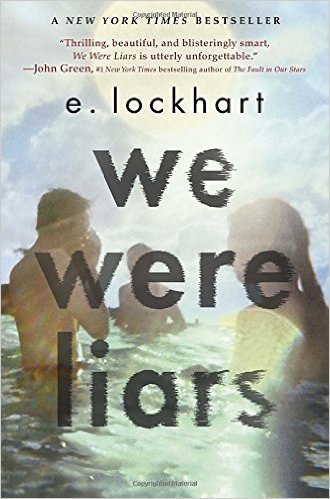
From Amazon:
A beautiful and distinguished family.
A private island.
A brilliant, damaged girl; a passionate, political boy.
A group of four friends—the Liars—whose friendship turns destructive.
A revolution. An accident. A secret.
Lies upon lies.
True love.
The truth.
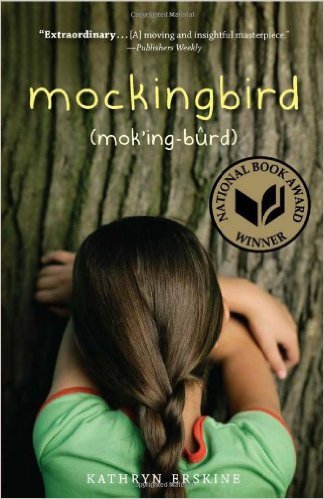
Mockingbird by Kathryn Erskine
From Amazon:
Caitlin has Asperger’s. The world according to her is black and white; anything in between is confusing. Before, when things got confusing, Caitlin went to her older brother, Devon, for help. But Devon was killed in a school shooting, and Caitlin’s dad is so distraught that he is just not helpful. Caitlin wants everything to go back to the way things were, but she doesn’t know how to do that. Then she comes across the word closure–and she realizes this is what she needs. And in her search for it, Caitlin discovers that the world may not be so black and white after all.
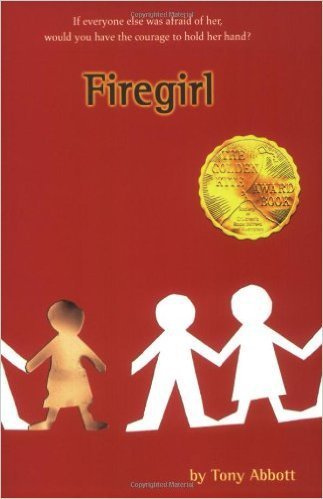
From Amazon:
From this moment on, life is never quite the same for Tom and his seventh-grade classmates. They learn that Jessica has been in a fire and was badly burned, and will be attending St. Catherine’s while getting medical treatments. Despite her horrifying appearance and the fear she evokes in him and most of the class, Tom slowly develops a tentative friendship with Jessica that changes his life.
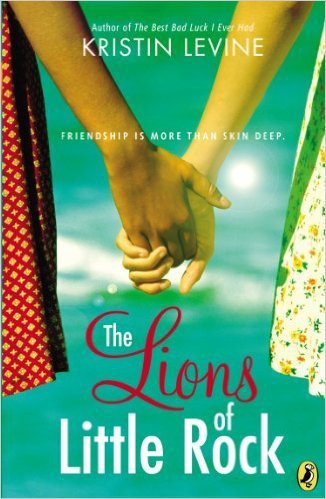
The Lions of Little Rock by Kristin Levine.
From Amazon:
Two girls separated by race form an unbreakable bond during the tumultuous integration of Little Rock schools in 1958
Twelve-year-old Marlee doesn’t have many friends until she meets Liz, the new girl at school. Liz is bold and brave, and always knows the right thing to say, especially to Sally, the resident mean girl. Liz even helps Marlee overcome her greatest fear – speaking, which Marlee never does outside her family.
But then Liz is gone, replaced by the rumor that she was a Negro girl passing as white. But Marlee decides that doesn’t matter. Liz is her best friend. And to stay friends, Marlee and Liz are willing to take on integration and the dangers their friendship could bring to both their families.
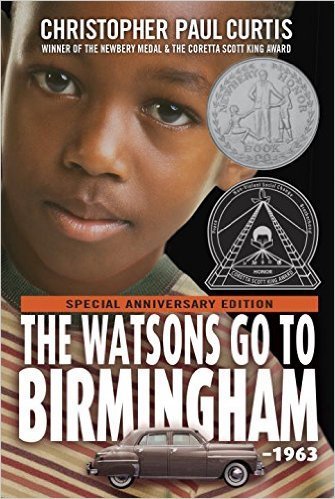
The Watsons Go to Birmingham – 1963 by Christopher Paul Curtis
From Amazon:
A wonderful middle-grade novel narrated by Kenny, 9, about his middle-class black family, the Weird Watsons of Flint, Michigan. When Kenny’s 13-year-old brother, Byron, gets to be too much trouble, they head South to Birmingham to visit Grandma, the one person who can shape him up. And they happen to be in Birmingham when Grandma’s church is blown up.
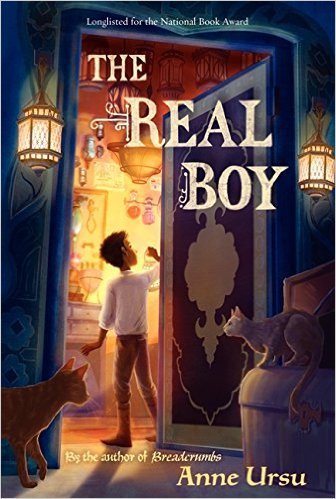
From Amazon:
On an island on the edge of an immense sea there is a city, a forest, and a boy. The city is called Asteri, a perfect city that was saved by the magic woven into its walls from a devastating plague that swept through the world over a hundred years before. The forest is called the Barrow, a vast wood of ancient trees that encircles the city and feeds the earth with magic. And the boy is called Oscar, a shop boy for the most powerful magician in the Barrow. Oscar spends his days in a small room in the dark cellar of his master’s shop, grinding herbs and dreaming of the wizards who once lived on the island generations ago. Oscar’s world is small, but he likes it that way. The real world is vast, strange, and unpredictable. And Oscar does not quite fit in it.
But it’s been a long time since anyone who could call himself a wizard walked the world, and now that world is changing. Children in the city are falling ill, and something sinister lurks in the forest. Oscar has long been content to stay in his small room in the cellar, comforted in the knowledge that the magic that flows from the trees will keep his island safe. Now, even magic may not be enough to save it.
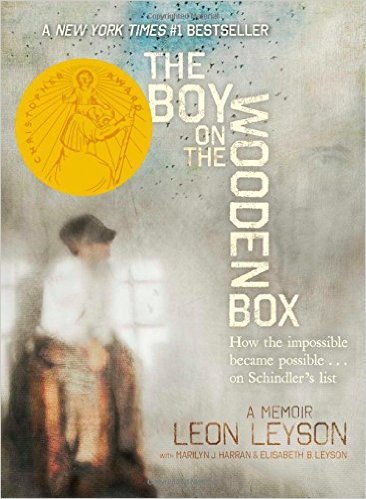
The Boy on the Wooden Box by Leon Leyson (Non-fiction)
From Amazon:
Even in the darkest of times—especially in the darkest of times—there is room for strength and bravery. A remarkable memoir from Leon Leyson, one of the youngest children to survive the Holocaust on Oskar Schindler’s list.Leon Leyson (born Leib Lezjon) was only ten years old when the Nazis invaded Poland and his family was forced to relocate to the Krakow ghetto. With incredible luck, perseverance, and grit, Leyson was able to survive the sadism of the Nazis, including that of the demonic Amon Goeth, commandant of Plaszow, the concentration camp outside Krakow. Ultimately, it was the generosity and cunning of one man, a man named Oskar Schindler, who saved Leon Leyson’s life, and the lives of his mother, his father, and two of his four siblings, by adding their names to his list of workers in his factory—a list that became world renowned: Schindler’s List.
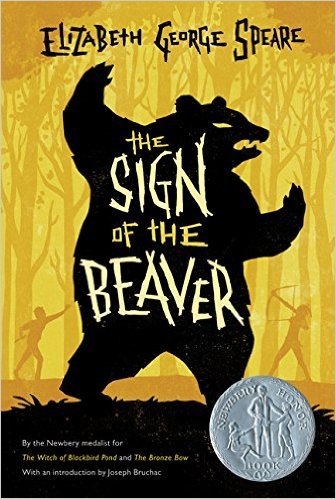
The Sign of the Beaver by Elizabeth George Speare
From Amazon:
Although he faces responsibility bravely, thirteen-year-old Matt is more than a little apprehensive when his father leaves him alone to guard their new cabin in the wilderness. When a renegade white stranger steals his gun, Matt realizes he has no way to shoot game or to protect himself. When Matt meets Attean, a boy in the Beaver clan, he begins to better understand their way of life and their growing problem in adapting to the white man and the changing frontier.

Fever 1793 by Laurie Halse Anderson
From Amazon:
During the summer of 1793, Mattie Cook lives above the family coffee shop with her widowed mother and grandfather. Mattie spends her days avoiding chores and making plans to turn the family business into the finest Philadelphia has ever seen. But then the fever breaks out.
Disease sweeps the streets, destroying everything in its path and turning Mattie’s world upside down. At her feverish mother’s insistence, Mattie flees the city with her grandfather. But she soon discovers that the sickness is everywhere, and Mattie must learn quickly how to survive in a city turned frantic with disease.
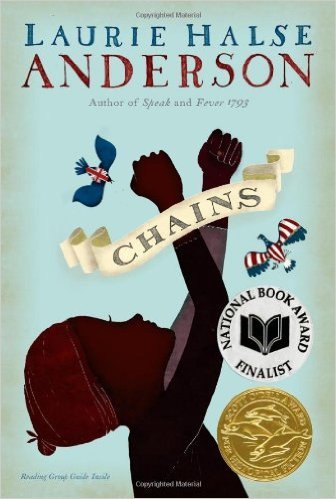
Chains by Laurie Halse Anderson
From Amazon:
As the Revolutionary War begins, thirteen-year-old Isabel wages her own fight…for freedom. Promised freedom upon the death of their owner, she and her sister, Ruth, in a cruel twist of fate become the property of a malicious New York City couple, the Locktons, who have no sympathy for the American Revolution and even less for Ruth and Isabel. When Isabel meets Curzon, a slave with ties to the Patriots, he encourages her to spy on her owners, who know details of British plans for invasion. She is reluctant at first, but when the unthinkable happens to Ruth, Isabel realizes her loyalty is available to the bidder who can provide her with freedom.
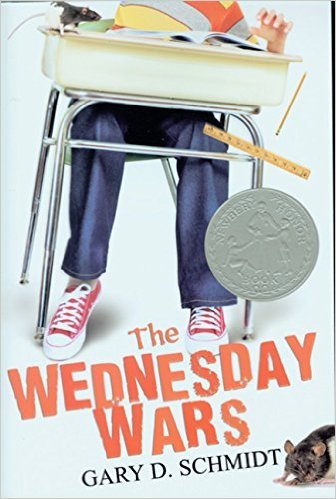
The Wednesday Wars by Gary D. Schmidt
From Amazon:
Meet Holling Hoodhood, a seventh-grader at Camillo Junior High, who must spend Wednesday afternoons with his teacher, Mrs. Baker, while the rest of the class has religious instruction. Mrs. Baker doesn’t like Holling—he’s sure of it. Why else would she make him read the plays of William Shakespeare outside class? But everyone has bigger things to worry about, like Vietnam. His father wants Holling and his sister to be on their best behavior: the success of his business depends on it. But how can Holling stay out of trouble when he has so much to contend with? A bully demanding cream puffs; angry rats; and a baseball hero signing autographs the very same night Holling has to appear in a play in yellow tights! As fate sneaks up on him again and again, Holling finds Motivation—the Big M—in the most unexpected places and musters up the courage to embrace his destiny, in spite of himself.
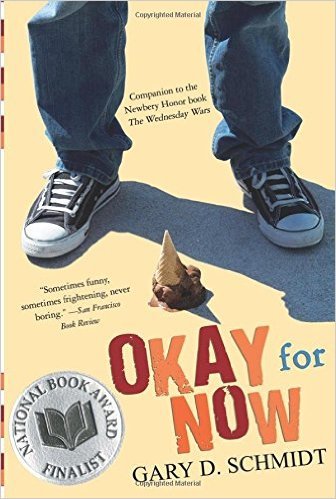
Okay for Now by Gary D. Schmidt
From Amazon:
In this companion novel to The Wednesday Wars, Doug struggles to be more than the “skinny thug” that some people think him to be. He finds an unlikely ally in Lil Spicer, who gives him the strength to endure an abusive father, the suspicions of a town, and the return of his oldest brother, forever scarred, from Vietnam. Schmidt expertly weaves multiple themes of loss and recovery in a story teeming with distinctive, unusual characters and invaluable lessons about love, creativity, and survival.
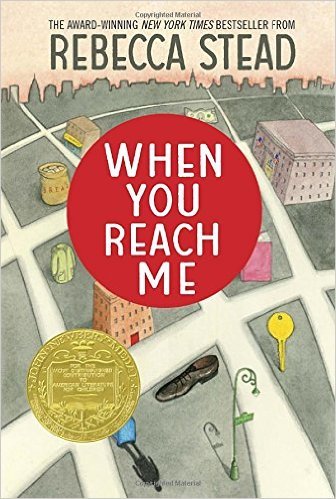
When You Reach Me by Rebecca Stead
From Amazon:
By sixth grade, Miranda and her best friend, Sal, know how to navigate their New York City neighborhood. They know where it’s safe to go, and they know who to avoid. Like the crazy guy on the corner.
But things start to unravel. Sal gets punched by a kid on the street for what seems like no reason, and he shuts Miranda out of his life. The apartment key that Miranda’s mom keeps hidden for emergencies is stolen. And then a mysterious note arrives, scrawled on a tiny slip of paper. The notes keep coming, and Miranda slowly realizes that whoever is leaving them knows things no one should know. Each message brings her closer to believing that only she can prevent a tragic death. Until the final note makes her think she’s too late.
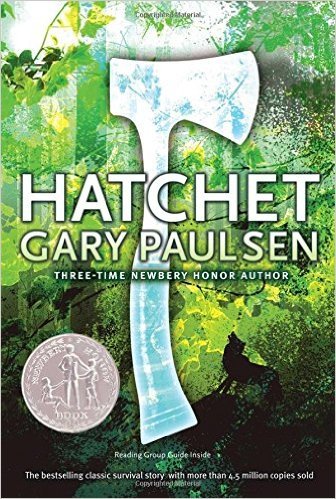
From Amazon:
Thirteen-year-old Brian Robeson is on his way to visit his father when the single-engine plane in which he is flying crashes. Suddenly, Brian finds himself alone in the Canadian wilderness with nothing but a tattered Windbreaker and the hatchet his mother gave him as a present—and the dreadful secret that has been tearing him apart since his parent’s divorce. But now Brian has no time for anger, self pity, or despair—it will take all his know-how and determination, and more courage than he knew he possessed, to survive.
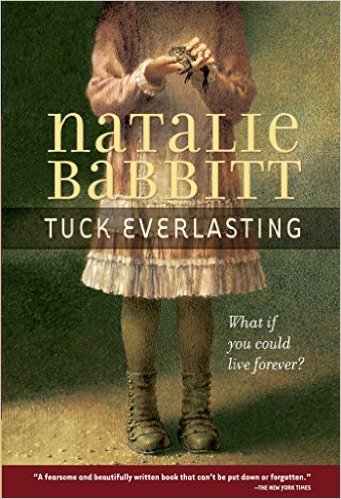
Tuck Everlasting by Natalie Babbitt
From Amazon:
Doomed to―or blessed with―eternal life after drinking from a magic spring, the Tuck family wanders about trying to live as inconspicuously and comfortably as they can. When ten-year-old Winnie Foster stumbles on their secret, the Tucks take her home and explain why living forever at one age is less a blessing that it might seem. Complications arise when Winnie is followed by a stranger who wants to market the spring water for a fortune.
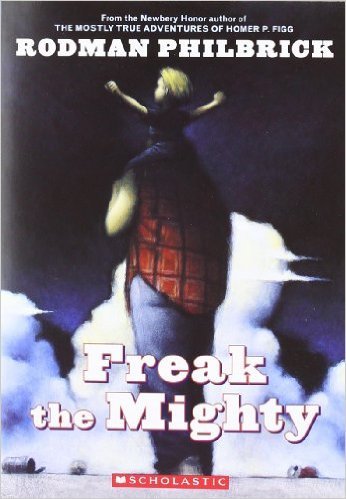
Freak the Mighty by Rodman Philbrick
From Amazon:
Two boys – a slow learner stuck in the body of a teenage giant and a tiny Einstein in leg braces – forge a unique friendship when they pair up to create one formidable human force.
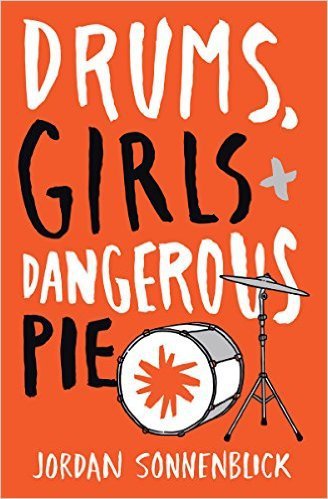
Drums, Girls, and Dangerous Pie by Jordan Sonnenblick
From Amazon:
Steven has a totally normal life (well, almost).
He plays drums in the All-City Jazz Band (whose members call him the Peasant), has a crush on the hottest girl in school (who doesn’t even know he’s alive), and is constantly annoyed by his younger brother, Jeffrey (who is cuter than cute – which is also pretty annoying). But when Jeffrey gets sick, Steven’s world is turned upside down, and he is forced to deal with his brother’s illness, his parents’ attempts to keep the family in one piece, his homework, the band, girls, and Dangerous Pie (yes, you’ll have to read the book to find out what that is!).
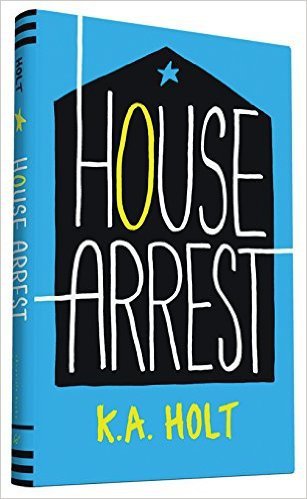
From Amazon:
Timothy is on probation. It’s a strange word—something that happens to other kids, to delinquents, not to kids like him. And yet, he is under house arrest for the next year. He must check in weekly with a probation officer and a therapist, and keep a journal for an entire year. And mostly, he has to stay out of trouble. But when he must take drastic measures to help his struggling family, staying out of trouble proves more difficult than Timothy ever thought it would be. By turns touching and funny, and always original, House Arrest is a middlegrade novel in verse about one boy’s path to redemption as he navigates life with a sick brother, a grieving mother, and one tough probation officer.
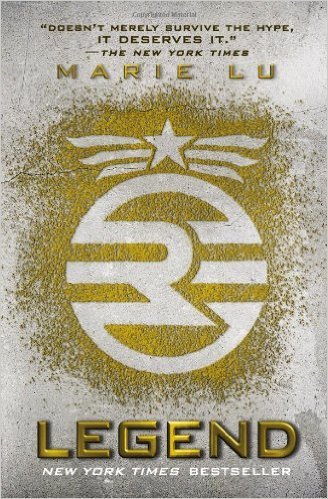
From Amazon:
What was once the western United States is now home to the Republic, a nation perpetually at war with its neighbors. Born into an elite family in one of the Republic’s wealthiest districts, fifteen-year-old June is a prodigy being groomed for success in the Republic’s highest military circles. Born into the slums, fifteen-year-old Day is the country’s most wanted criminal. But his motives may not be as malicious as they seem.
From very different worlds, June and Day have no reason to cross paths – until the day June’s brother, Metias, is murdered and Day becomes the prime suspect. Caught in the ultimate game of cat and mouse, Day is in a race for his family’s survival, while June seeks to avenge Metias’s death. But in a shocking turn of events, the two uncover the truth of what has really brought them together, and the sinister lengths their country will go to keep its secrets.
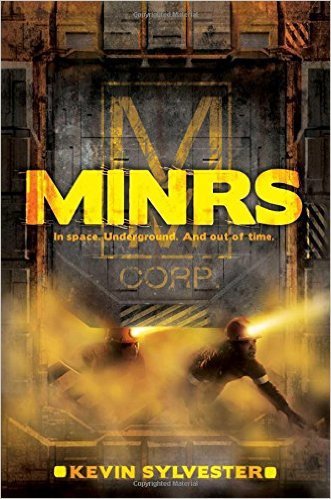
From Amazon:
A boy and his friends must find a way to survive in the mining tunnels after their new space colony is attacked in this gritty action-adventure novel, which School Library Journal called “a solid survival story.”
In space. Underground. And out of time.
Christopher Nichols and his family live on a new planet, Perses, as colonists of Melming Mining’s Great Mission to save the earth. Dozens of families like Christopher’s have relocated, too, like his best friend Elena Rosales.
A communications blackout with Earth hits, and all of Perses is on its own for three months. It’s okay, though, because the colonists have prepared, stockpiling food and resources to survive. But they never prepared for an attack.
Landers, as the attackers are called, obliterate the colony to steal the metal and raw ore. Now in a race against time, Christopher, along with a small group of survivors, are forced into the maze of mining tunnels. The kids run. They hide. But can they survive?
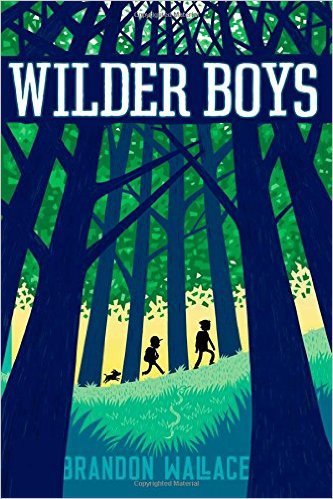
Wilder Boys by Brandon Wallace
From Amazon:
Two brothers will need all their wilderness skills to survive when they set off into the woods of Wyoming in search of their absent father.Jake and Taylor Wilder have been taking care of themselves for a long time. Their father abandoned the family years ago, and their mother is too busy working and running interference between the boys and her boyfriend, Bull, to spend a lot of time with them. Thirteen-year-old Jake spends most of his time reading. He pours over his father’s journal, which is full of wilderness facts and survival tips. Eleven-year-old Taylor likes to be outside playing with their dog, Cody, or joking around with the other kids in the neighborhood.
But one night everything changes. The boys discover a dangerous secret that Bull is hiding.
And the next day, they come home from school to find their mother unconscious in an ambulance. Knowing they are no longer safe and with nowhere else to go, the Wilder Boys head off in search of their father. They only have his old letters and journal to help them, but they have to make it.
It’s a long journey from the suburbs of Pittsburgh to the wilderness of Wyoming; can the Wilder Boys find their father before Bull catches up with them?
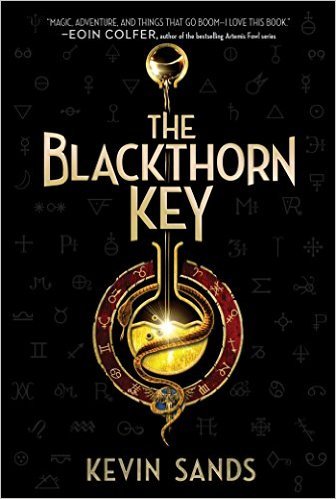
The Blackthorn Key by Kevin Sands
From Amazon:
“Tell no one what I’ve given you.”
Until he got that cryptic warning, Christopher Rowe was happy, learning how to solve complex codes and puzzles and creating powerful medicines, potions, and weapons as an apprentice to Master Benedict Blackthorn—with maybe an explosion or two along the way.
But when a mysterious cult begins to prey on London’s apothecaries, the trail of murders grows closer and closer to Blackthorn’s shop. With time running out, Christopher must use every skill he’s learned to discover the key to a terrible secret with the power to tear the world apart.
I know I am forgetting some and probably even some really good ones. I will update the list after I have ventured into our classroom at some point this summer. In the meantime, please share your great middle school rbook club choices in the comments.
Filed under: being a teacher, Book Clubs, Literacy, Reading


July 2, 2016
What 10 Minutes of Reading Really Is
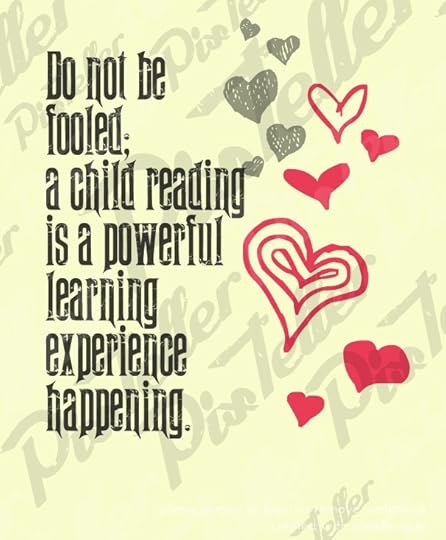
For the past 2 years, my students in 7th grade English have started almost every single class with 10 minutes of independent reading. With 10 minutes of falling into a book. With 10 minutes dedicated to the one thing that research says will make the biggest difference to their reading comprehension. When you teach just 45 minute classes, giving up 10 minutes can be seen as a major sacrifice, and yet, it never is; after all, reading time is one of the biggest gifts I can give all of my students. And offering them up 10 minutes to read the pages of a book they choose is the biggest investment I can make into their future reading lives. I give it gladly.
To an outsider it may seem like the 10 minutes is enough, that all you need for a successful reading experience is just to give kids time. But if you dug a little bit deeper, you would start to see all of the work that leads up to these quick 10 minutes, all of the investment that has happened before all of my students are actually reading. So what do the 10 minutes rest upon?
An enticing classroom library. For the past 6 years, I have been spending a lot of money, yes, my own mostly, to try to build up a library that would entice my students. Just this morning, I realized I needed to go to the book store to find more sports books as I look at the year to come. While our library now is large, it certainly did not start out that way; when I weeded my books, I had less than 150 left, but they were of decent quality and so our foundation started with that. Having an in-class library, coupled with a school library, has made a huge difference to my not so invested readers. The books are right there, at their fingertips, and they can bookshop any time they want. They do not have to wait for library time or even a pass to grab a new book. However, having a school library has also made a huge difference because they see a knowledgeable adult that can help guide them to books we do not have in our classroom library. Another adult has the chance to know them as readers and to help them select their next favorite read. I do not think my students would read as much if they didn’t have immediate access to books that spoke to them.
An exploration of reading identity. We spend a lot of time reflecting on who we are as readers, much to the chagrin of some of my most resistant readers. They are content with declaring themselves as non-readers and would prefer for it to be left at that. However, starting on the second day of school we start to dig into what type of a reader they and also what their goals are. They start to evaluate what has shaped their reading journey so I can figure out how to best support them further, or break down some ingrained habits of non-reading. This is a constant conversation in our classroom; what do you like to read, how do you know, why do you abandon books, what book do you want to read next are all questions that surround us as we discover who we are and who we want to be.
A reading-obsessed adult. I read voraciously, even when it is summer, so that I can pass books to my students. I am connected to other reading crazed adults so that I can find more books for our library. Being a reader myself, and especially of the books we have in our classroom, means that I can speak the same language as my students. By handing books to students and telling them that this may work, we start to develop a deeper relationship than just student/teacher, instead developing one based on the books we love. If you reach reading, you should be a reader yourself, because how can you expect students to invest into something if you don’t invest yourself?
An understanding of self. We learn how to book shop together, to-be-read list in hand, because this is a skill that many of my students have not developed. When they do not know how to find the next great book, they don’t read. It becomes one more thing that they use to not read. So together, we bookshop and tie it in with our reading identity exploration. We make it a social event at least once a month, adding as many titles as we can to our list, but it is also an anytime event. If a child is constantly book shopping it tells me they do not know who they are as readers and so the conversation starts there.
A challenge. Modeled after Donalyn Miller’s 40 Book Challenge, my students have a 25 book challenge (or higher for those where 25 books is not a big deal) and this challenge drives us forward as we plan our reading. All students read with urgency, not at a hurried pace, but with the need to read more than the year prior. We discuss our progress, we revisit goals and we tweak as needed.
A goal. My students are not “just” reading, although frankly “just” reading for some would be a major win. They are always working on something, however, many of them are working on goals directly tied to their reading identity, or the lack of one. So while some kids may be working on skills tied to their reading comprehension, others may simply be working on habits; trying to find a book they actually want to read, trying to re-identify themselves as readers. When I confer with students, I ask about their specific goals and if they do not have one, then we set one together.
A learning purpose. We use Notice and Note from Kylene Beers and Bob Probst to dig deeper into our reading, as a springboard to discuss and write about our reading, and so students are expected to do this work at all times. However, they are not always doing that work, sometimes we read simply to read. What matters is that they CAN do it when needed. We also read to identify writing craft, to learn about the world,, and to explore ourselves as human beings. Having a self-selected text as a way to spur discussion means that all of the students are able to participate in conversations, because they have actually read the book.
For the past 2 years, I have seen many 7th graders rediscover a lost love of reading or even start to work toward a better relationship with books and reading. Almost every single child I have had the honor of teaching has read more books than they thought possible. When I ask them what made the biggest difference they tell me that the 10 minutes made them into readers. I always smile, because I know that the 10 minutes played a major factor, but they forget all of the other components that come into play when we have a well-developed independent reading experience in our classroom. So start with the time, but do not think that is enough. After all, we are not just teaching reading, but trying to create reading experiences.
I am currently working on two separate literacy books. While the task is daunting and intimidating, it is incredible to once again get to share the phenomenal words of my students as they push me to be a better teacher. The first book titled Reimaging Literacy Through Global Collaboration is scheduled for release November, 2016 by Solution Tree. The second, which I am still writing, is tentatively Passionate Readers and will be published in the summer of 2017 by Routledge. So until then if you like what you read here, consider reading my book Passionate Learners – How to Engage and Empower Your Students. Also, if you are wondering where I will be in the coming year or would like to have me speak, please see this page.
Filed under: being a student, being a teacher, Literacy, Reading, Reading Identity


June 29, 2016
Home
I have been in 5 different states in the last 7 days. Aware of the incredible honor it is to speak to other educators, to be valued as anything more than what I feel I am. But the truth is; I am so tired. I miss my family so much that my heart hurts. I miss being able to take full breaths, be at my house, and just being a part of the crazy experiment we call our life.
As I got to the airport in Denver today and saw that my flight was delayed, I instantly felt tears. Right there in the middle of the airport, I stood like an emotional fool, because that delay means I don’t get to be home at bed time. I don’t get to be there to say goodnight, to sing a song, to then sing one more song, and to perhaps just fall asleep right next to one of them. That delay means that I break the promise I made my oldest daughter as I spoke to her last night. As she cried and asked when I would be home because her tummy hurt, and her head hurt, and perhaps every single part of her hurt. I promised that yes, Mommy would be home to tuck her in, yes, Mommy would be home before she slept. And I know that sometimes that is just how it goes, but still.
So I did the only thing I could; I went to the book store right in front of me. All the way to the back to where the children’s books live and I let the experience soak in. As the smell embraced me, as the books surrounded me, as the whole feeling that only a place with books can evoke in you, my heart settled ever so slightly. In the pages of the books I browsed, I found my small sliver of peace. Within this space I didn’t feel quite as lonely, quite as lost. Home.
I think of the kids who have found their home within the pages of a book. Who have needed the freedom of the pages to live the life they hope for. Who have reached, much like me, for the familiarity of an experience that they know will never disappoint, will never fail them, will always make them feel like somewhere in this world all is right and nothing can harm them at that moment. How books are not just something we read, but something we become. How within the pages of a book we may rediscover who we need to be.
Our job as educators, as adults who love books, is to provide the same opportunity for the children we teach. To give them a space where no matter what is happening, their heart might feel slightly more at peace, where the loneliness may just be a little bit further away. Where they can reach for a book and know that within its pages their life will become more than it was before.
Because in the end, it was never really about the content we had to cover, but all about the experiences we created. About the discovery that happened. About the moments where we needed to be found, and we were. All in the pages of a book.
Filed under: being a teacher


June 28, 2016
I’ve Had Enough – No More Public Behavior Management Systems
When I was a 5th grade teacher, my classroom was the very last one before the buses. Every day, all of the school’s students would pass by and inevitably some of those students and I would strike up a conversation. Day after day, a little kindergartener would tell me about his day, his shoes, his new fish, or whatever else popped into his mind. One day, he saw me and beamed,”Guess what, Mrs. Ripp!” “What?” I asked. “Peter was on yellow today!” He told this news as if it was the biggest gift, excitement spilling from his little body. Momentarily confused, because wasn’t this child’s name distinctly not Peter, it finally dawned on me; he was talking about another student. “Oh yeah?” I said. “Yes, Mrs. Ripp, it’s exciting, he hasn’t been on yellow all year…” It was November. My heart dropped.
Here was a kindergarten student who every single day so far of the year had been on red. Who every day had their behavior dissected in front of the rest of the class. Whose classroom identity was being distinctly shaped by poor decisions and whose biggest identifier was his behavior. I can only imagine what my kindergarten friend would tell his parent every day about Peter.
And that is the thing. As a parent, as another teacher, as someone who is outside of your classroom community, I should not be able to see which child is having a bad day. I should not be able to walk into your room and see the aftermath of something that did not happen in front of me. That is a personal matter between the child, the teacher, and that child’s parents. Why do we seem to forget that every time we hang a behavior chart, display our cups, or even use Class Dojo publicly?
Why do we make our classrooms that are supposed to function on trust and support and turn them into halls of public shame for some kids? Where is the outrage? Or do parents not even know?
I get that there are kids that need behavior system, I have some of those kids too, but those behavior systems should center on privacy. Should center on knowing the child. Should center on the fact that we are dealing with another human being, that yes, may make poor decisions upon poor decisions, but they are still somebody’s child. If we are looking for long-term change then that will never start with public shame, but it certainly ends there.
When we use public behavior management systems, we tell those children that school will never be a place where they will succeed. We put them under an unattainable microscope and then wonder why they rebel. We watch for the smallest infraction and then come down hard, making sure that they know who is in control, who holds the power, but did they really ever forget that? And sure, for some kids it will make a change, for some kids it will take one down clip, one stick moved, one lost point and they will never do that behavior again because they have been embarrassed sufficiently. Is that what we want to shape the behavior of our children? But if we already know by the start of a day, which children will probably be on red or yellow, which child will already have a bad day, then why do we need to make it public? Why make that a self-fulfilling prophecy? Instead, we should be wondering how our school seems to not be working, and what do we need to change?
Today I was asked what I would use instead of a classroom behavior system or Class Dojo? My answer; common sense and kindness. Patience, communication, and yes, even private plans. No child deserves to be publicly humiliated day upon day, they deserve better than this. We can do better.
PS: Here is a link to all of my posts talking about what you can do instead.
Filed under: behavior, being a teacher, student choice, Student Engagement, Student-centered


June 27, 2016
Who Are We Really Doing This For?
Traveling this summer seems to have offered me a lot of time for reflection. There is something about sitting on an airplane, getting nervous about the days ahead and thinking of how did one ever up there? I realize time and time again that there are certain truths that guide everything I do and that if I ever stray from those truths then I hope I have the spine to admit it. Because as I travel, I realize more and more that this is not about me, about Pernille the teacher, but instead about the very kids I teach. About the kids we all teach and yet we seem to so easily forget that as we make decisions in our schools, in our classrooms.
So I realize once again that while I may think I have all of the answers, I won’t ever know unless I ask my students. That my job is not to foresee and problem solve every little thing, but instead to let them explore and to create alongside me.
That when we go out and share what our students are doing, we need to recognize that this is not about us, but about them. That it is their education at stake, not our own, and that is why this mission is so very urgent.
We are losing kids every single day in our classrooms. We are losing them when we remove control over even the slightest things. We treat them in a way we would not want to be treated ourselves, and then expect them to just be ok with it because that is a part of childhood. We dictate bathroom breaks, where they sit, who they work with, and even how they share, sometimes allowing very little autonomy in the process. And then at the end of the day we wonder why they are exhausted and cannot wait to get on with their “real” life?
What if every decision we made was centered on what is best for students? I know we say that that is what drives us, but is it really? When we decide on curriculum do we pick it because it is easy for the adults to implement or because it will inspire the children? When we seek out learning opportunities do we do it for the right reasons or because it is another thing to check off our to do list?
When we control our classrooms so that we can function, do we ever wonder who those we teach will react to the perimeters we set up?
So we can talk about personalizing learning, or whatever other buzz term we are all infatuated with at the moment, or we can talk about good teaching. About creating learning opportunities that center on the student, on the child, and not the adult needs. We can remove the “alizing” and just focus on the person instead.
Change may seem hard, but it gets easier as we go. Think of the small things that already communicate to students that what they need is not as important as what we need. Think of all the little rules we have in our classrooms that do not benefit them nearly as much as they benefit us. And then do something about it.
When I ask my students what they wish every teacher would do it is not to give them less work, to give them less tests, or even to speak less – we teachers, do love to talk – it is to let them choose where they sit. Almost every time. If that doesn’t speak volumes about how powerless students feel in their education, I am not sure what will.
So this summer, or winter depending on where you are, whenever a new decision needs to be made, don’t think of what you need. Think of what kids might need, and if you are not sure; ask them. They are ready to tell us if we only ask.
I am currently working on two separate literacy books. While the task is daunting and intimidating, it is incredible to once again get to share the phenomenal words of my students as they push me to be a better teacher. The first book titled Reimaging Literacy Through Global Collaboration is scheduled for release November, 2016 by Solution Tree. The second, which I am still writing, is tentatively Passionate Readers and will be published in the summer of 2017 by Routledge. So until then if you like what you read here, consider reading my book Passionate Learners – How to Engage and Empower Your Students. Also, if you are wondering where I will be in the coming year or would like to have me speak, please see this page.
Filed under: being a student, being a teacher, Personalized Learning, student choice, Student dreams, student driven, Student Engagement


June 23, 2016
6 Years Ago Today
Six years ago today, I had one child, she was 1 1/2, just starting to talk, discovering the world. She still napped and the house would get so quiet, I was never quite sure what to do with myself. 6 years ago today, I was a 4th grade teacher, hoping that my next year would not be the year that I quit teaching. Hoping that these ideas I had to possibly be a better teacher would actually work out and maybe, just maybe, my students would hate school less. 6 years ago today, I googled how to start a blog and then wrote my very first post. It was all about how I was going to blog and I was excited but had no idea what I was really going to write about.
6 years ago today is just like today. I still don’t know what my next post will be about until the words hit me and I know I have to write them. I look back over the years and am so proud of all of the words that my students have allowed me to share. Of all of the stories, yes even of failure, and how they possibly have made the smallest difference not just to me, but perhaps to another educator.
6 years ago today, I felt crazy, like I was certainly alone with these thoughts and ideas. That I would probably lose my job if I didn’t quit first. Now, 6 years later, my life is fuller than I ever thought it would be and I know that I am not alone; there are many fighting for change in education, just like me. That our students voices can change and shape the way we teach, if only we start listening to them and then doing something about what they tell us.
I have never had a long-term plan when it came to this little blog. It continues to be my truth-o-meter, my way of releasing the thoughts that keep my up at night. My way of reminding myself that I am not perfect, but merely human, and that it is okay to not strive for perfection, but strive for connections instead. This blog keeps me honest so that I actually teach the way I write, and not just concoct fanciful notions of what great teachers do with fictitious students.
6 years of posts means that there are too many to count, too many to remember. But this one, Dear Arnold, is the one that I will never forget writing because it was the first time I cried as I wrote. The first time I thought I had no business sharing these thoughts yet had to get them out before my heart broke even more. It started me on a path of absolute honesty, even if it meant not painting myself in a good light. I am so glad Arnold pushed me that way.
6 years ago today I had no idea how changed my life would be. How a small summer idea, as always prompted by my husband, would lead me down a different path than the one I had set out on. I am so grateful to this space, to the small act of courage it took for me to hit publish. Not because it might have made a difference to others, but because it made the biggest difference to me.
PS: I sometimes get asked about the significance of the name behind the blog. I am here to unfortunately say that it was not because I had thought of how it would allude to time, representing the journey I was about to begin. That would have been so wonderful it it was the truth. The real story is rather boring because it simply alluded to the fact that I was a 4th grade teacher at the time, thus “Blogging Through the Fourth Dimension” it was.
Filed under: being a teacher, being me


June 21, 2016
The Reading Rules We Would Never Follow as Adult Readers
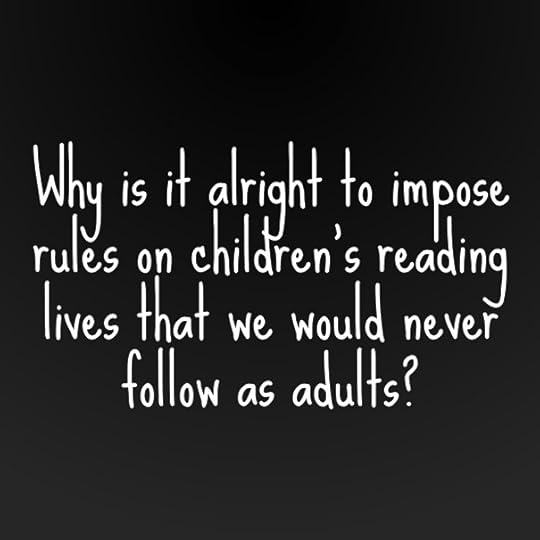
Choice.
The number one thing all the students I have polled through the years want the most when it comes to reading. No matter how I phrase the question, this answer in all of its versions is always at the top. Sometimes pleading, sometimes demanding, sometimes just stated as a matter of fact; please let us choose the books we want to read.
Yet, how often is this a reality for the students we teach? How often, in our eagerness to be great teachers, do we remove or disallow the very things students yearn for to have meaningful literacy experiences? How many of the things we do to students would we never put up with ourselves? In our quest to create lifelong readers, we seem to be missing some very basic truths about what makes a reader. So what are the rules we would probably not always follow ourselves?
Removing choice. I have to start with the most obvious; removing choice in reading (and even in writing). We know that choice matters, we know as adult readers we revel in the sheer experience of being able to choose what we want to read. We take it for granted and will even rebel in small ways when someone says we have to read something. Choice is the cornerstone of our own literacy life, yet it is one of the first things we tend to remove for children, especially fragile or developing readers. And I get it, we think we know better when students repeatedly choose wrong, yet, it is in the selection process that students can uncover who they are as readers, if we give them time to discuss, reflect, and yes, even try the things they choose that may not be a great fit.
Forced reflection. We seem to be reflecting kids to death with our requirements to write a little bit about every book they read. Or having them keep a reading journal or having them write about the signposts or whatever else they are finding when they independently read. It is not that we shouldn’t have students reflect when they read, it is that we make these one-size-fits-all requirements where students cannot discover how they would like to digest their reading. How often do we as adults write a paragraph every time we finish a book? Or summarize it? Or make a diorama, (which yes, I made my students do)? While I know adults that would love to do all of those things, I also know many that would not. In fact, many adult readers I know would slow down their reading or hide their reading if they had to do all of that “work.” When I teach the signposts (from the excellent book Notice and NoteNotice and Note) I tell my students that they are not expected to find them when they are reading at home, but that they are meant to be able to find them when asked. There is a big difference in the way they feel about the task because it is not something they have to do all of the time.
Forced tracking. Oh reading logs, I am looking at you here. Yes, as an adult I track my reading on my Goodreads account. I even write reviews sometimes. But I don’t track my pages (unless I have a bigger purpose in mind and then it is for short amount of time), or time how long I read for, or even have my husband sign for me. I make time to read because I love reading. And while we can say that reading logs foster more reading because it is a check up system, it also kills reading for many. If you want to see if the kids are reading, have them read in class and pay attention to what they are reading. Allow students to track in a way that is meaningful to them; Goodreads, notebook page, poster, pictures of books on their phone, or even through conversations. There is no one system that fits all and if a system we have in place is even killing the love of reading for one child, then we need to rethink it.
Points and competition. Yes, AR, you have it coming. Plus all of the other initiatives that we put in place to urge students to read. And I get it; we desperately want students to become readers and to keep reading, yet this short-term solution can actually have a long-term consequence; kids who do not read for reading’s sake but for the prizes or honors attached to it. We know what the research says regarding motivation and reading and how it can actually have adverse effects, and yet, we continue to concoct programs to try to get them reading. How many adults though would read more because we then could take a computerized test that would give us points? How many adults would be okay with their reading lives on display for the world to see? Some would, while others would hate for the world to know something that they see as a personal discovery. Why do we assume that what might work for one child will work for all?
Limited abandonment. As an adult reader I practice wild book abandonment, passing books on when I know they are not right for me, yet as teachers, we often have rules for when students are allowed to abandon a book. I used to subscribe to the 50 page rule myself. Why? If a child wants to abandon a book, they are on their way to knowing themselves better as a reader. This is something to celebrate, not something to limit. If a child is a serial book abandoner, and yes, I have a few of those, then we should be asking them why, rather than just stopping them. What did they not like about this book? What do they need to look for instead? Help them explore their reading identity so that they can develop it rather than have them mimic yours.
Inane bookshopping rules. My students used to be allowed to bookshop on Fridays. That was it. Yet, as an adult reader I bookshop all of the time. I am constantly on the prowl for the next great read and my to-be-read list is ever expanding. I get that book shopping or browsing sometimes becomes an escape for a child when they do not want to read, but then we work with that one child, rather than impose limits for all. My students know that book shopping can happen anytime during our independent reading time, or even if they have completed other tasks. I would rather want children that want to look at books, than those who abhor it.
When my students started telling me their reading truths, I drove home in shame; how many of the very things they told me had killed their love of reading where things that I had done myself as a teacher? How many of the things was I still doing? Yet, within the words of my students, I found the biggest truth of all; different children need different reading experiences and so that means now is I try to create a passionate reading environment, where there is room and scaffold for all of my readers. Not just those that can work in one system concocted by me. I know that sometimes large things are out of our control, yet, there are so many small things that are. Think of what made you a reader or what stopped you from becoming one and then use that reflection to shape the way reading is taught and practiced in your own learning environment. Being a teacher means that we learn from our mistakes, I have made many, and it means that we continue to strive for better. We cannot do that if we don’t listen to the students. And you know what; don’t take my word for it; ask your own students. Then listen. Then do something about it.
PS: Today I pondered out loud on Twitter how many educators tell students to read at home or over the summer and never read themselves. Being a reading role model should be a requirement for all teachers of reading, it makes a huge difference.
If you are wondering why there seems to be a common thread to so many of my posts as of late, it is because I am working on two separate literacy books. While the task is daunting and intimidating, it is incredible to once again get to share the phenomenal words of my students as they push me to be a better teacher. The first book tentatively titled The Global Literacy Classroom is scheduled for release November, 2016 by Solution Tree. The second, which I am still writing, is tentatively Passionate Readers and will be published in the summer of 2017 by Routledge. So until then if you like what you read here, consider reading my book Passionate Learners – How to Engage and Empower Your Students. Also, if you are wondering where I will be in the coming year or would like to have me speak, please see this page.
Filed under: being a teacher, Literacy, Reading, Reading Identity, student choice, Student dreams


June 19, 2016
I Don’t Do It All
This week someone called me Superwoman. Teaching full-time, writing books, speaking, and then returning home to try to be the best mother that I can be for my 4 (still) young children. How do I do it all? How do I find the time? I am here to burst that illusion. I am not Superwoman, nor do I ever want to be. Because Superwoman was alone in her endeavor, mostly relying on her own skills to save the world. Only once in a while, reaching out to others for help when the problem seemed insurmountable. She thrived by herself; eager for the next challenge.
But behind me stands a very strong man, a man who saw more in me than I ever did. A man who told me that I could not change the students, but I could change the way I taught. I married Brandon 11 years ago and 11 years ago we decided to have a child. It took us almost 3 years to fulfill that dream, but for the last 8 years I have watched as the man I love, has become an incredible father.
So when people ask me how I do it all, I quickly tell them that I don’t. That I am not alone in this crazy adventure. That at home I have the biggest supporter, the biggest motivator, the guy with the biggest heart, even if his sometimes quiet exterior doesn’t show it. He shapes me, he shapes our children and I am so grateful that he said yes so many years ago to be a part of this crazy adventure.
I asked Oskar, this morning why he loves his Dad and Oskar answered, “Because he is so good.” I asked him what he was good at. Oskar answered, “At pouring lemonade…” Not quite the answer I had expected, and yet perfect in my eyes. Because that’s it, isn’t it? It’s not just that Brandon is great at all of the big things, like taking care of us, or fixing things, or all of those other big things that dad’s are supposed to master. It’s that he is great at the little things too; at putting band-aids on scrapes, reading aloud every night, singing along to Emily Arrow, and yes, at pouring lemonade. Because those are the things that matter, maybe not to others, but to me, to our children. Those are the reasons why I am so lucky.
So to the man who gave me the most important job in the world; thank you for seeing something in me when you agreed that perhaps having kids was after all in our future. That perhaps raising a family together was a dream we should pursue. That perhaps it was okay if our life got a little crazy, because at least it would mean that our house would be filled with love. There is no one else I would want to share this journey with. Happy Father’s Day to all the dad’s out there that get to pour the lemonade.
Filed under: being a teacher, being me


June 17, 2016
The Leveled Library; When Is It Time to Remove the Scaffold?
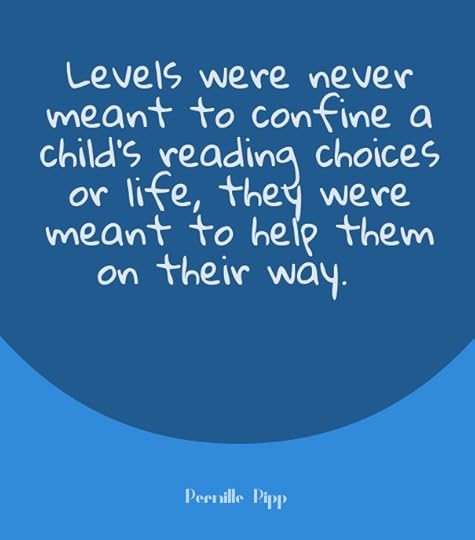
When I was a 5th grade teacher, I was told to level my library, or at least a part of it. When I asked why, I was told that it needed to be done so that students could find the right fit books. Yet, in our classroom, this was already happening. I was a 5th grade teacher after all and most students had many different ways of determining whether a book would be the right fit for them or not. This was something we had developed throughout the year. Just like when they went to our school library, the students knew to pick up books, flip through the pages and determine whether they wanted to read a book by reading a few pages and so on.
When I present, I often discuss levels and our seemingly obsession with the boxes they create for us. We love when we can quickly point a child in the right direction. We love when we can hand a kid a stack of books without having read them and say; these are for you because their level told me so. Whether Lexile, Fountas & Pinnell, AR score, or another contrived measuring form; levels seems to have permeated our educational experience. And it makes sense, after all, with our obsession with data and standardized testing, we love when we can break something complicated down to something tangible. But reading identity was never meant to be broken down like this.
Levels are not meant to be a child’s label, but a teacher’s tool to quote Fountas & Pinnell. They were never meant to be hindrances to children exploring books, nor were they meant to be the focal point of how we know a reader. They were meant for guiding us, the teachers, as we planned our instruction in order to help students succeed at the reading strategies we were teaching. And yet, I have seen entire classroom libraries designated by letters, even whole school ones. I have heard from librarians that were told that they had to police their book check outs to make sure a child had picked the correct books. From teachers who have seen children stop reading because they were only allowed to pick from certain boxes. Levels have even shown up in our book order magazines in order to help parents guide their child’s decision.
I cannot be the only one that is horrified at what this is doing to our readers?
You see, levels, much like a child’s reading level, is meant to be a scaffold. We start our early readers by guiding them using every tool that we have, including the reading level they are at, as we try to help them figure out how to pick books by themselves. Having a level or a letter helps them on their beginning journeys as readers. So does the five-finger rule. Yet at some point, our conversation needs to move beyond the letter, or whatever other designator we have. We need to shift the exploration of reader identity past the easy and into the hard. We need to start asking students what draws them to books and what keeps them there. How do they know when a book will be successful for them? How do they book shop? How do they keep track of what they want to read next? It has to be more than just because the level said it would work for them. Those conversations take time, they take energy, and they take us knowing our students in a deeper way than just their supposed reading ability. It also takes investment from our readers, which again, takes time within our curriculum. If our goal is to create reading experiences where students will leave our classrooms and school knowing who they are as a reader, then our conversation has to extend beyond the level.
So before we level our entire library, or even tell a child what level they are at, remember that depending on our students, it may be not only unnecessary, but also damaging to their future reading life. As educators our main goal is to create independent learners, yet the very levels we use to help students reach independence means that they are not. Moving beyond a level, a label, or whatever else we have decided will break down a child for us must be a priority as teachers of reading. We must ensure that their reading identity does not hinge on an outside indicator, but instead on their own understanding of themselves as readers. That takes time, and while time seems to be something we have very little of in school, it is an investment into their future life as adult readers.
Levels were never meant to confine a child’s reading choices or life, they were meant to help them on their way. Much like we remove training wheels from a bike when a child is old enough, we must remove the levels as well. We owe it to the future adults we teach.
PS: I love this post from Kylene Beers “A Kid is Not an “H””
If you are wondering why there seems to be a common thread to so many of my posts as of late, it is because I am working on two separate literacy books. While the task is daunting and intimidating, it is incredible to once again get to share the phenomenal words of my students as they push me to be a better teacher. The first book tentatively titled The Global Literacy Classroom is scheduled for release November, 2016 by Solution Tree. The second, which I am still writing, is tentatively Passionate Readers and will be published in the summer of 2017 by Routledge. So until then if you like what you read here, consider reading my book Passionate Learners – How to Engage and Empower Your Students. Also, if you are wondering where I will be in the coming year or would like to have me speak, please see this page.
Filed under: being a student, being a teacher, Literacy, Reading, Reading Identity, student choice, Student dreams, student driven


June 15, 2016
The Book All Leaders Should Read
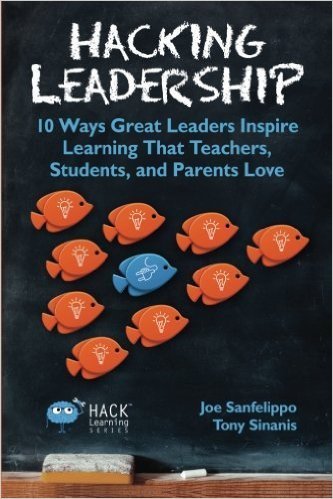
I have been lucky to call Joe Sanfelippo and Tony Sinanis friends for a few years now. I have watched as they have taken their amazing ideas from theirs schools and districts and amplified them into the world. I have seen how their words and through leading by example have helped others become more human in their leadership, more adept at navigating what it means to be a leader for all, and not just some.
So when I was sent a copy of their new book, Hacking Leadership, I knew I wanted to read it….at some point. But a leadership book? What did I really need that for? On Sunday night, as I flew to North Dakota, I decided to glance at it, to get a feel for the book so to speak. 2 hours later, I was done with the book. Mesmerized by the amazing ideas that unfolded in its pages, I was live tweeting quotes from the book, not because they had asked me too, but because these words resonated so deeply with me that I had to share them with others. The next night I added one of their quotes to the reading presentation I was giving, ending with their words rather than my own. I am not sure how else to put this; but this book? This book will change education if we let it.

What Tony and Joe have done is taken some very common problems in our schools, that seem to cross boundary lines, socioeconomic lines, and any other lines that may distinguish our schools from one another, and given us tangible solutions. Ideas that we can not only implement starting tomorrow, but also a blueprint for long-term change. They make no excuses for the roles of leaders within these problems, which as a teacher I found refreshing, and yet they do not blame, they merely point out the obvious and then offer up solutions right away. And these solutions are not long-winded plans that will be forgotten after the first day, but small “hacks” that will have an immediate effect.
Sending positive notes home to a teacher’s family and support network thanking them for their support because it truly takes a village to change the world, yes please. Making 100 phone calls home to parents on the 100th day of school to highlight awesome work, yes please. Having students share the news from their school so they can shape the narrative, having students and parents as part of hiring committees even in elementary, asking for feedback more than once a year, yes please. Trusting teachers to develop learning opportunities, knowing that for many it will allow them relevant PD , but also knowing that some will still abuse the system but not letting that hinder you, YES PLEASE!

The book may say that there are 10 hacks in it, but there are so many more. From the small and seemingly insignificant like making sure you speak to all staff members by keeping a checklist, to the truly groundbreaking way that Tony and Joe have empowered students, staff, and their community to be a part of their schools; this book should be required reading for all people in a leadership position, no matter their philosophy, no matter their experience. In fact, if I were a superintendent, I would order a copy of this book for all of my leaders and make it their summer read.
I recommend many books as I speak, but hardly ever any PD books. It takes a lot for me to really feel like a book is worth telling others about when it comes to how they should grow as an educator, grow as a practitioner. The Book Whisperer and Book Love are really the two books that I recommend the most, but now they have been joined by Hacking Leadership. A book I wasn’t really sure that I needed to read, but now can’t stop raving about.
Read this book, pass it on, or better yet get everyone you know a copy and then try the ideas. Change small. Change big. Create a school community where every child, every adult feels that their voice matters. Follow the words of advice from Tony and Joe that I loved so much I took a picture of them to remind myself. “Not too many people wake up in the morning and say that they can’t wait to be average today.” Don’t be average, hack your leadership and see the difference. I am so grateful that this book is out there for all of us to learn from, even if we didn’t think we had much growing to do in the first place.
Filed under: being a teacher





